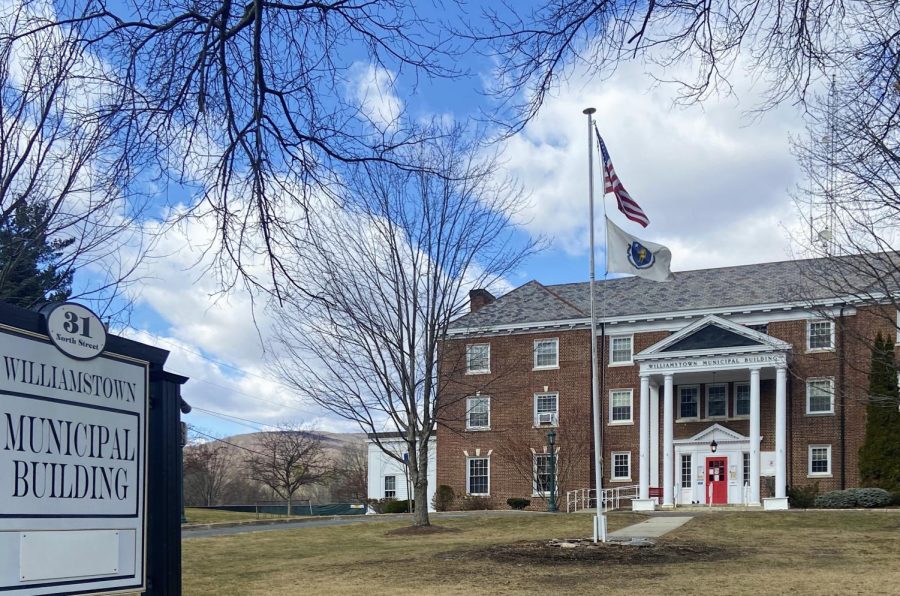The Williamstown Select Board voted 4-1 against adopting a proposed resolution signed by 421 Town residents that calls for an “immediate and permanent ceasefire in Palestine and Israel” at its meeting on March 25. Members of the Select Board said they voted against the resolution on the grounds that it was not their place to weigh in on political issues outside the Town, while others disagreed with the text of the proposed resolution. Select Board member Randy Fippinger cast the sole dissenting vote. Both the Select Board and the resolution’s proponents declined to place it on May’s Town Meeting agenda — meaning that voters will not have a chance to decide on the resolution.
A group of citizens first presented a version of the ceasefire resolution to the Select Board during the public comment period of the Select Board’s Feb. 12 meeting. Members of the Select Board originally encouraged proponents of the resolution to submit it as a citizens’ petition for consideration at Town Meeting, but proponents said then that they preferred immediate action by the Select Board over waiting until Town Meeting. The Select Board, which does not respond to or act upon public comment, added the resolution to the agenda for its March 25 meeting, prompting the vote.
Some Select Board members said they voted against the resolution because they believed it was beyond their office’s duties. “I think taking on a public office is a serious responsibility, and anybody who does that has to be respectful of the limits of the office,” Select Board member Andy Hogeland ’76 said at the meeting. “No one elected us to opine on [Middle East] politics, military strategy, or the terms of prisoner exchanges.”
Select Board chair Jeff Johnson, who said he agreed with the substance of the resolution, also voted against it on procedural grounds. He said the Town’s governmental structure differs from that of other municipalities that have passed measures similar to the resolution.
While city councils in other municipalities are primary deliberative bodies of their communities, legislative power in the Town is vested in the Town Meeting, where all registered voters deliberate and vote on proposed laws and resolutions each year. The Select Board does not have direct legislative power on most matters, though Johnson noted at the meeting that the Town’s external counsel had indicated that it would be legal for the Select Board to adopt the non-binding ceasefire resolution.
“If we were a city council, I’d be voting for this in a second,” Johnson said at the meeting.
Some speakers objected to the stipulations of the resolution during the March 25 meeting’s public comment window. “While some of the resolution’s wording is aspirational for an inclusive and caring local community, the call for an immediate and permanent ceasefire denies Israel’s right to defend itself from Hamas,” said Dara Kaufman, the executive director of the Jewish Federation of the Berkshires. “The call to release all hostages, detainees, and prisoners by both Hamas and the Israeli government conflates the brutal abduction of innocent hostages … with combat prisoners and convicted criminals. This suggests a false moral equivalency that is absolutely not acceptable.”
Additionally, Select Board members expressed qualms with the wording of the resolution. “I think some of the language came across as inflammatory to some of the people in our community,” Select Board member Stephanie Boyd told the Record. At the meeting, Boyd read an alternative resolution she had written, which she told the Record she viewed as more balanced between condemnation of Israel and Hamas. The alternative resolution was intended as a framework for action at a subsequent meeting if her colleagues had been willing to pass a resolution in some form, she said. However, Boyd did not move to bring her alternative to a vote, given that three of the Select Board’s five members were opposed to a resolution altogether.
“I have heard from some people that the word ‘ceasefire’ felt uncomfortable, and I challenge those individuals to ask themselves why,” Anna Moriarty-Lev, one of the resolution’s signatories and most vocal advocates, wrote to the Record. “‘Ceasefire’ means both sides negotiate a peace that they agree to. There is nothing controversial in that idea. At the heart of our resolution was the idea that Williamstown rejects all forms of bigotry, racism, antisemitism, anti-Arab, and anti-Muslim bias, and that all humans deserve safety and freedom.”
Fippinger, who cast the sole vote in favor of the resolution, said he saw it as an articulation of the Town’s values. “While you could split hairs and say ‘Well, we shouldn’t be talking about Gaza,’ I think we can talk about what we value as a community … from a humanitarian perspective,” he told the Record. He explained that, by supporting the resolution, he hoped to acknowledge the work of its writers and proponents. “I didn’t want this massive effort of these members of Town to go down by a 5-0 vote, even though it was very obvious by that point that it was going to fail,” he said.
At the meeting, Fippinger asked if the Select Board could pass the resolution to voters by adding it to the agenda for the annual Town Meeting on May 23. At the March 25 meeting, just ahead of the deadline to finalize the Town Meeting warrant, the Select Board could have still placed a resolution on the agenda before the deadline but did not take any votes on proposing a warrant article.
However, 200 registered voters could still call a special Town Meeting where citizens can vote on the resolution, as they did in February 2003 on a similar measure about the Iraq War.
Proponents of the resolution said that they still have no plans to shift the resolution to a special Town Meeting. “A Town Meeting, which regularly includes about 300 people who can drive to Mt. Greylock [Regional High School], don’t have kids needing care, and aren’t working, is not inherently more democratic than hundreds of citizens publicly voicing their views, months of meetings and community events, and a group of our duly elected representatives expressing their position,” Town resident Ben Lee-Cohen ’06 wrote in a letter to the Select Board, which he shared with the Record.
“It would mean asking members of our community who have already made themselves vulnerable by publicly supporting Palestine, to continue putting themselves at risk,” Moriarty-Lev added in an email to the Record. “To put ourselves through all of that again, just to possibly be voted against, again, does not feel productive or helpful to our Muslim and Arab-American neighbors.”
Select Board member Jane Patton said at the March 25 meeting that she was disappointed to not see a warrant article on the ceasefire resolution at Town Meeting. “On an issue like this, every person in Town should have the opportunity to vote on it,” she said.
“I really do wish that we as a Select Board did more,” Fippinger told the Record after the meeting. Fippinger said he regretted that the Select Board did not move towards taking actions other than approving the specific language in the proposed resolution, such as sending a warrant article to Town Meeting or voting on an alternative resolution like the one Boyd proposed. “I personally think it is a failure of leadership on our part, as a Select Board … [to focus] on this one vote on one resolution. As a Town, we are seeing … people wanting something from us, and I feel … that it’s our obligation to do something.”
Safiyah Anwar-Chuku, Luke Chinman, and Julia Karp — three members of the Record board who were among the signatories of the resolution — were not involved in the writing or editing of this article.















